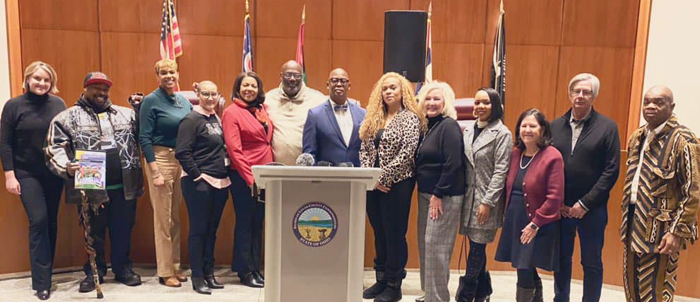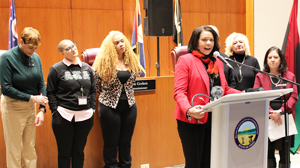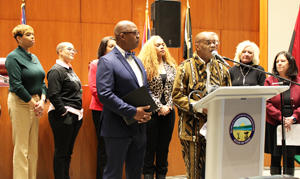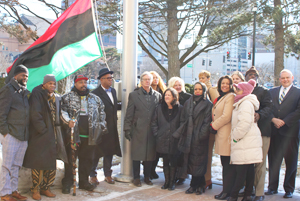
The Truth Staff
For the sixth year, the Pan African flag has been hoisted over One Government Center to commemorate Black History Month. The flag raising took place on February 1 in frigid temperatures but the speeches acknowledging the month and the flag took place in the relative comfort of the Lucas County Commissioners’ chambers.

“We still have battles; we are fighting but it’s important that we stay connected,” said Crystal Harris Darnell, the Lucas County director of Diversity, Equity and Inclusion, as she started the round of commemorative addresses.
Washington Muhammad, a founder of the Community Solidarity Response Network, introduced Rahwae Shuman, an educator connected to CSRN, to speak of the guiding principles of Kwanzaa such as unity, self determination, collective work and responsibility, cooperative economics, purpose, creativity and faith.
“We still haven’t found our solution to the ‘Negro problem,’” said Shuman. “We need unity in our families, we need self determination as we see a government in Florida telling us how to tell our story.” Shuman challenged the Black community to “get education, we should go from being the least educated people in America, to the most educated in this year.”
Rev. Willie Perryman, president of the Toledo Chapter NAACP, offered a prayer calling for “truth, justice, balance, equity, harmony and inclusion.”
Tracee Perryman, PhD, director of the Center of Hope Family Services, sang a rousing rendition of the Black National Anthem.
Then Lucas County Commissioner Pete Gerken introduced the painful subject of the backwards steps that have occurred in parts of the nations with respect to equity and inclusion.

“I come to this not so much in a position of celebration as much as in a position of anger,” said Gerken. “The Klan mentality has risen in certain state legislatures in the South.” Noting, in particular, the recent responses to the teaching of African American history, Gerken said: “We can’t teach history – the high points and the low points.” Gerken said it’s all right for White people to feel uncomfortable about things that have happened in this nation’s history.
“It’s time for a little disturbance,” he added.
Gerken’s points were amplified by his fellow Lucas County Commissioners, Tina Skeldon Wozniak and Lisa Sobecki and also by Toledo Mayor Wade Kapszukiewicz. However, they also added their feelings that Toledo and Lucas County are doing far better than so many other parts of the nation in their emphasis on equity and inclusion.
“Many communities won’t do this or say, ‘we have a lot of work to do,’” said Skeldon Wozniak. “We recognize and know we have a lot of work to do, we have a strong, wonderfully diverse city.”
“I am so proud to live in Lucas County and Toledo,” said Sobecki. “But in Ohio, we can teach kids about Nazism but not about African American history. Take the next 28 days to learn something about African American history.
Sobecki then related what she had recently learned about the Pan African flag that will fly at Government Center during the month of February.
 Red is for the blood that flowed during the time of slavery, she noted. Black represents the skin color and green stands for the fertility of the African culture.
Red is for the blood that flowed during the time of slavery, she noted. Black represents the skin color and green stands for the fertility of the African culture.
Kapszukiewicz also voiced his concerns about the state of the nation.
“It’s hard not to be frustrated by some of the forces at work,” he said. “It’s hard to have hope sometimes when you think of these things on a national level. What gives me hope is what happens locally. Here in Toledo we get it right more than we get it wrong. Every day in Toledo is a day to celebrate Black history … Toledo is a special place.”
Councilwoman Vanice Williams followed the speeches of the four White elected officials by expressing her eagerness to accept their willingness to work for the cause of equity and inclusion.
“I’m happy today,” she said. “The word I think of is ‘allyship.’ As we stand here with our White allies, and they want to be made to feel uncomfortable, we accept that challenge … I celebrate Black history every day because I see it every day.”
Erika White, Communications Workers of America Local 4319, speaking on behalf of the Toledo Chapter NAACP, said the Pan-African flag represented “pride, unification and change making … a symbol of a rich cultural history.” White observed that the flag is “a unifying symbol … introduced in the 1920s, it is still a symbol of American activism – a symbol of a rich cultural history.
CSRN co-founder Jodie Summers, activist, writer and spoken word artist, performed one of his pieces and asked in the refrain: “How much longer will we keep waiting for a handout to get a hand up?”
After noting that the CSRN was founded in 2014 in the wake of the news that the policeman who killed Michael Brown in Ferguson, Missouri, would not be indicted, Washington Muhammad closed out the event by thanking “so many for raising the Pan African flag.”
